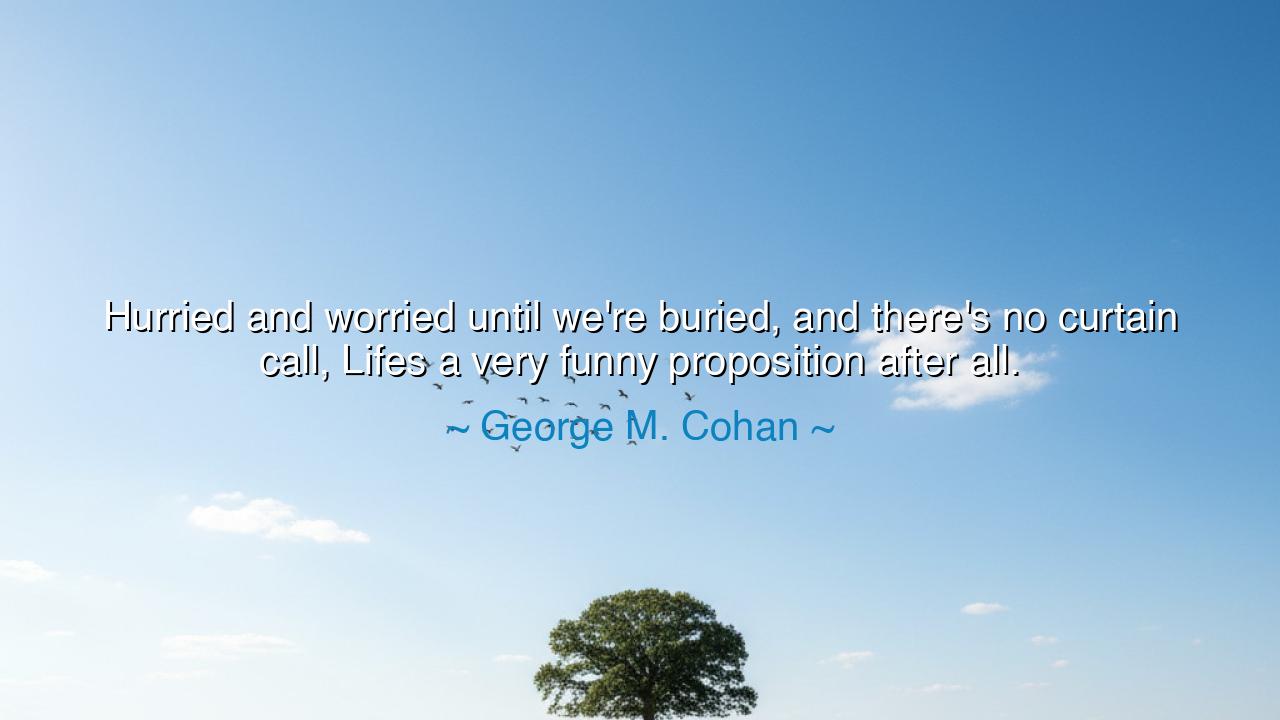
Hurried and worried until we're buried, and there's no curtain
Hurried and worried until we're buried, and there's no curtain call, Lifes a very funny proposition after all.






“Hurried and worried until we're buried, and there's no curtain call, life’s a very funny proposition after all.” — George M. Cohan
In these immortal words, George M. Cohan — the playwright, showman, and poet of America’s early stage — laid bare one of the oldest truths known to humankind. He spoke not merely of theater or of laughter, but of the tragic comedy of existence itself. Life, he reminds us, is both brief and bewildering — a stage upon which we rush, fret, and stumble, only to find that there is no curtain call. The lights go dim, the play ends, and the actors vanish into silence. And yet, he calls it a “funny proposition,” not in mockery, but in wisdom — for the humor of life lies in its irony: that we spend our days hurried and worried, chasing shadows, while the true essence of living often slips quietly between our fingers.
To the ancients, this truth was not new. The Stoic philosophers of Greece and Rome — men like Seneca and Epictetus — also warned against the madness of haste and the vanity of worry. “It is not that we have a short time to live,” Seneca wrote, “but that we waste much of it.” Like Cohan, he saw how mortals exhaust themselves in endless striving, seeking fame, wealth, or security — only to reach the end with hearts still unsatisfied. The hurried life blinds us to wonder; the worried mind forgets to be grateful. And when death arrives, there is no encore, no applause, no chance to rewrite our lines. The performance is over.
Cohan, a man of the theater, understood the metaphor deeply. On stage, every actor hopes for a curtain call, a moment to stand before the crowd and be recognized for their labor. But life offers no such finale. When the play of our days concludes, our audience disperses, our voice fades, and only the memory of our deeds remains. The origin of his words springs from that bittersweet recognition — that while we may never control the end, we can choose how we perform while the spotlight still shines. If life is a play, then let it be one worth remembering, not through grand endings, but through the truth and heart of the scenes we live.
There is a story from history that captures this spirit — the tale of Emperor Marcus Aurelius, ruler of Rome and philosopher of peace. Surrounded by power, war, and death, he wrote in his Meditations not of conquest, but of acceptance. “Do not act as if you were going to live ten thousand years,” he said. “Death hangs over you. While you live, while it is in your power, be good.” Though he bore the weight of an empire, he sought calm within, knowing that all the triumphs of men vanish like dust when the play ends. He too saw the funny proposition of life — that those who spend it chasing control lose it most swiftly, while those who live with grace and humor truly master it.
Cohan’s words carry an undertone both tender and tragic. The phrase “hurried and worried” describes not merely busyness, but blindness — the way men and women hurry past beauty in their quest for meaning, and worry about tomorrow while today withers away. Yet when he calls life “funny,” he invites us to step back and laugh gently at ourselves. For what else can one do when facing the absurdity of fate? The humor he speaks of is not the laughter of jesters, but the wisdom of acceptance — a deep, knowing smile at the mystery that no man can solve.
To understand this quote is to learn how to live more slowly, more intentionally, more joyfully. We must remember that there is no curtain call, and therefore every act counts. The embrace you give, the kindness you show, the beauty you notice — these are your performance. The wise do not rush to the next scene; they inhabit the one they’re in. They understand that even the fleeting moments of sorrow and failure have their place in the great script of life.
So, my child, when you feel hurried, pause. When you feel worried, breathe. Remember that the clock is a false master, and the applause of others fades quickly. Live not for recognition, but for presence. Laugh at your troubles when you can, and if you cannot laugh, at least smile at their smallness compared to eternity. For in the end, when the lights dim and the curtain falls, what will matter is not how fast you lived, but how fully. And then, perhaps, when your play is done, you will walk quietly into that final silence — not with regret, but with a smile — knowing that, yes, life was a very funny proposition after all.






AAdministratorAdministrator
Welcome, honored guests. Please leave a comment, we will respond soon